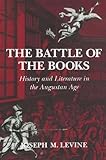The Battle of the Books : History and Literature in the Augustan Age / Joseph M. Levine.
Material type: TextPublisher: Ithaca, NY : Cornell University Press, [2018]Copyright date: ©1994Description: 1 online resource (448 p.) : 12 halftonesContent type:
TextPublisher: Ithaca, NY : Cornell University Press, [2018]Copyright date: ©1994Description: 1 online resource (448 p.) : 12 halftonesContent type: - 9781501727641
- Ancients and moderns, Quarrel of
- Classical literature -- Appreciation -- Great Britain
- Classical literature -- History and criticism -- Theory, etc
- Classicism -- Great Britain -- History -- 18th century
- Classicism -- Great Britain
- Comparative literature -- Classical and modern
- Comparative literature -- Modern and classical
- Criticism -- Great Britain -- History -- 18th century
- English literature -- 18th century -- History and criticism
- Historiography -- Great Britain -- History -- 18th century
- England
- History
- HISTORY / Europe / Great Britain / General
- 907/.2042
- DA485 .L48 1991eb
- online - DeGruyter
| Item type | Current library | Call number | URL | Status | Notes | Barcode | |
|---|---|---|---|---|---|---|---|
 eBook
eBook
|
Biblioteca "Angelicum" Pont. Univ. S.Tommaso d'Aquino Nuvola online | online - DeGruyter (Browse shelf(Opens below)) | Online access | Not for loan (Accesso limitato) | Accesso per gli utenti autorizzati / Access for authorized users | (dgr)9781501727641 |
Browsing Biblioteca "Angelicum" Pont. Univ. S.Tommaso d'Aquino shelves, Shelving location: Nuvola online Close shelf browser (Hides shelf browser)

|

|

|

|

|

|

|
||
| online - DeGruyter Pharaoh's Workers : The Villagers of Deir el Medina / | online - DeGruyter Sex and Society in the World of the Orthodox Slavs 900–1700 / | online - DeGruyter Agents of Empire : Spanish Ambassadors in Sixteenth-Century Italy / | online - DeGruyter The Battle of the Books : History and Literature in the Augustan Age / | online - DeGruyter Racism in Mind / | online - DeGruyter Music in the Moment / | online - DeGruyter From Newgate to Dannemora : The Rise of the Penitentiary in New York, 1796–1848 / |
Frontmatter -- Contents -- Illustrations -- Acknowledgments -- Introduction -- PART ONE. LITERATURE -- 1. Wotton vs. Temple -- 2. Bentley vs. Christ Church -- 3. Stroke and Counterstroke -- 4. The Querelle -- 5. Ancient Greece and Modern Scholarship -- 6. Pope's Iliad -- 7. Pope and the Quarrel between the Ancients and the Moderns -- 8. Bentley's Milton -- PART TWO. HISTORY -- 9. History and Theory -- 10. Ancients -- 11. Moderns -- 12. Ancients and Moderns -- Conclusion -- Index
restricted access online access with authorization star
http://purl.org/coar/access_right/c_16ec
Joseph M. Levine provides a witty and erudite account of one of the most celebrated chapters in English cultural history, the acrimonious quarrel between the "ancients" and the "moderns" which Jonathan Swift dubbed "the Battle of the Books." The dispute that amused and excited the English world of letters from 1690 until the 1730s was, Levine shows, an installment in the long-standing debate about the relationship of classical learning to modern life.Levine argues that the debate was fundamentally a quarrel about the rival claims of history and literature concerning the proper way to understand the authors of the past. He skillfully examines how both sides wrote their own brands of history: The moderns, led by Richard Bentley, proposed that the "modern" inventions of classical scholarship and archaeology gave them a superior insight into the past; the ancients, marshaled by Jonathan Swift and Alexander Pope, held out for a more direct imitation of antiquity and opposed the new scholarship with all the force of their satire and invective. Levine demonstrates that the ancients and the moderns influenced each other in powerful ways, and had much more in common than they knew. Chronicling a critical episode in the development of modem scholarship, The Battle of the Books illuminates the roots of present-day controversies about the role of the classics in the curriculum and the place of the humanities in education.
Mode of access: Internet via World Wide Web.
In English.
Description based on online resource; title from PDF title page (publisher's Web site, viewed 26. Apr 2024)


